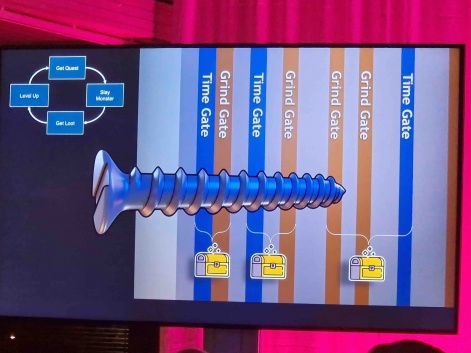It’s the final day of Pocket Gamer Connects Helsinki 2023 today and on the Game Maker Insights panel, game architect at Crosshatch Games, Dave Cross took to the stage for a session named ‘Unwinding core loops: detect these patterns early to avert a failed launch.’
Cross began his talk by enticingly offering that “While I have been a part of successful launches in the games industry, it isn’t those successes I want to talk about, but instead I want to talk about failures.”
Cross went deep into the science of a game’s core loop and how these loops follow logical steps for the player. “This core loop is where you spend 90% of your time,” he explained. “The loop needs to both challenge and reward the player and each link in a core loop makes sense but reversing it wouldn't make sense, so a player may slay a monster, earn rewards and then level up.”

At this point Cross introduced a metaphor that ran the duration of his talk. He used the example of a screw as the player’s progress, entering deeper into a piece of wood (the game) with the player being the screwdriver. Playing the game results in the screw going into the wood. As the player plays he works through the game driving forwards while turning the game’s core content loop.
Turning the loop
Cross then approached the idea of ‘gates’. “If you don’t have enough gates in your content you can't monetise your content,” he said. “Gates touch on the aspect of difficulty and skill, the sense of grind in a game and time. These gates equal progress and if your game doesn't have them then players don’t feel like they are achieving anything.”
Cross also noted that certain in-game content can help motivate players. Again, using the screw as a metaphor, if the player is stuck then they can be offered in game boosters in order to progress. Tactics such as this ensure that the player is able to continue pushing through the core loop of the game.
Cross used mobile game June’s Journey as an example. As an original prototype it failed because the core loop didn’t work. The items players found would go toward a collection, this would then allow players to trade for currency and gain the ability to decorate their island but “this gameplay loop failed because neither of the progressions worked alongside each other. If players made their collections quickly then it felt trivial, there was no challenge. But if you make it more challenging then players never felt like they got to decorate their island.”
In the end June’s Journey adapted to a new core gameplay loop and became a success. Eventually it even brought back the concept of collections. “These were added into the game again later but this time they worked beyond the core loop, so instead of being the focus it simply contributed and acted as its own feature which meant it didn’t impact the new core loop.”





















